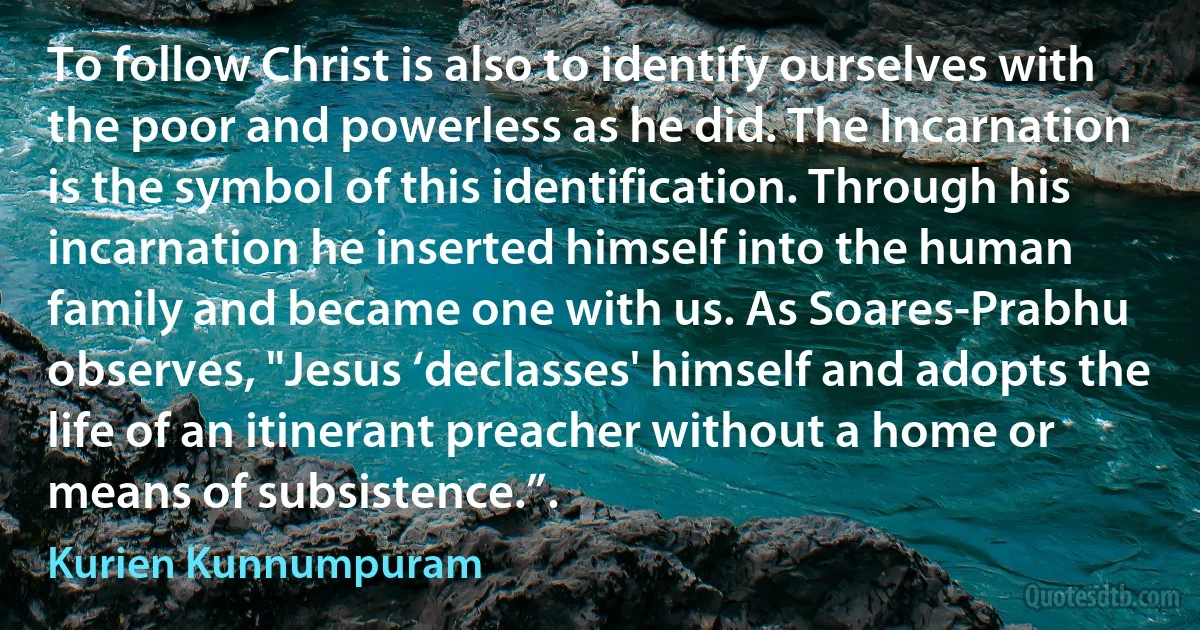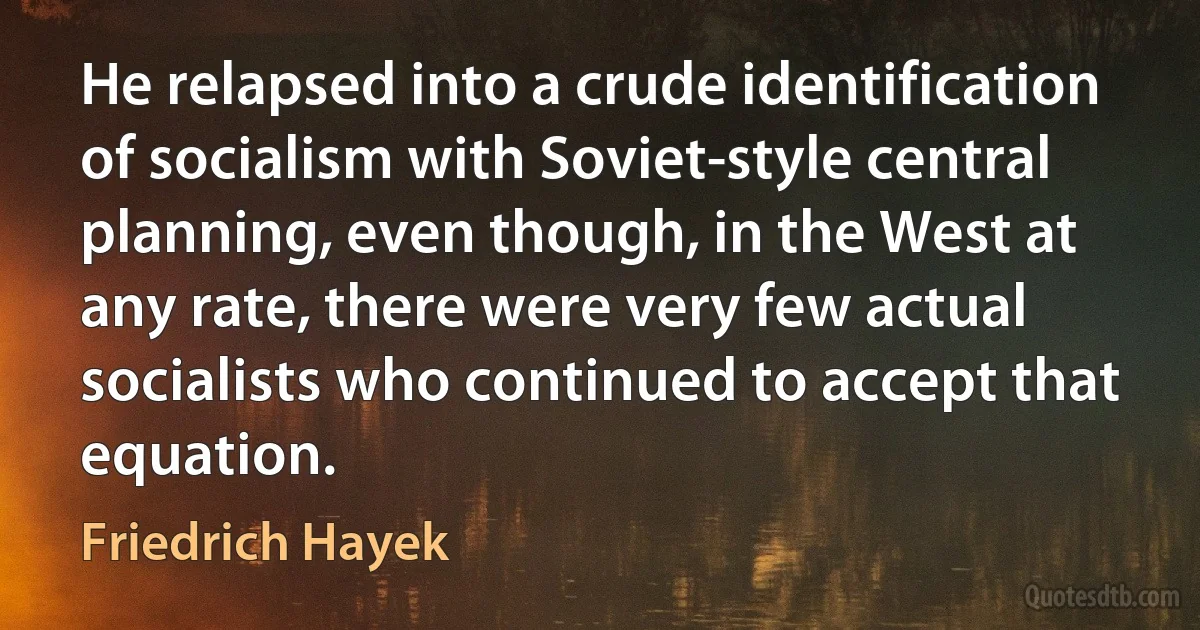Identification Quotes - page 6
People always died in the most hidden places. They'd bleed to death, I guess. By the time their bodies were brought in, they're bloated, and they'd dig out the identification tags on some corpse's chest, maggots all over the place. And those aren't scenes which you want to report to your people back home. I mean, everybody would think it was their own son. I didn't have his name.

Larry LeSueur
There is a powerful expression of our yearning. But now that we have the revolutionary spirit, we must not lose sight of the brotherhood awareness. Temper the revolutionary spirit. Culture identification is needed, but we must not let it lead us to hatred. We can become intoxicated and lose sight of our real goal to fully participate in the political system of the United States.

Reies Tijerina
Most post-mortems of these software disaster projects have indicated that their problems would have been avoided or strongly reduced if there had been an explicit early concern with identifying and resolving their high-risk elements. Frequently, these projects were swept along by a tide of optimistic enthusiasm during their early phases, which caused them to miss some clear signals of high risk issues which proved to be the project's downfall later.
Enthusiasm for new software capabilities is a good thing. But it needs to be tempered with a concern for early identification and resolution of a project's high-risk elements, so that people can get these resolved early and then focus their enthusiasm and energy on the positive aspects of their software product.

Barry Boehm
The Pentagon admitted the Iraqi was never given an identification number and that the Red Cross was never notified about his capture. However, [Defense Secretary] Donald Rumsfeld claims the prisoner has been treated in accordance with Geneva Conventions, including regular conjugal visits with his favorite goat.

Dennis Miller
b) all legal provisions of past and present Congressional Pork Barrel Laws, such as the previous PDAF and CDF Articles and the various Congressional Insertions which authorize/d legislators – whether individually or collectively organized into committees – to intervene, assume or participate in any of the various post-enactment stages of the budget execution, such as but not limited to the areas of project identification, modification and revision of project identification, fund release and/or fund realignment, unrelated to the power of congressional oversight.

Francis Escudero
The existential way of understanding human beings has some illustrious progenitors in Western history, such as Socrates in his dialogues, Augustine in his depth-psychological analyses of the self, Pascal in his struggle to find a place for the "heart's reasons which the reason knows not of.” But it arose specifically just over a hundred years ago in Kierkegaard's violent protest against the reigning rationalism of his day Hegel's "totalitarianism of reason,” to use Maritain's phrase. Kierkegaard proclaimed that Hegel's identification of abstract truth with reality was an illusion and amounted to trickery. "Truth exists,” wrote Kierkegaard, "only as the individual himself produces it in action.”.

Rollo May
What is a symbol? Etymologically speaking, the word σύμβολον comes from σνμβάλλω, to throw-with, to make something coincide with something else: a symbol was originally an identification mark made up of two halves of a coin or of a medal. Two halves of the same thing, either one standing for the other, both becoming, however, fully effective only when they matched to make up, again, the original whole. ... in the original concept of symbol, there is the suggestion of a final recomposition. Etymologies, however, do not necessarily tell the truth - or, at least, they tell the truth, in terms of historical, not of structural, semantics. What is frequently appreciated in many so-called symbols is exactly their vagueness, their openness, their fruitful ineffectiveness to express a 'final' meaning, so that with symbols and by symbols one indicates what is always beyond one's reach.

Umberto Eco
Mr. President and Mrs. Reagan and friends of my brother here at this ceremony and everywhere, on behalf of Ethel and her children and all the members of our family, let me thank you, Mr. President, for this great honor that you have given to Robert Kennedy. And it is appropriate that he should receive it from you, for he understood so well that the common love of our country transcends all party identification and all partisan difference. And you should know that after he debated you on international television in 1967, my brother Bob said that Ronald Reagan was the toughest debater he ever faced and, obviously, he was right.

Ted Kennedy
In the outset, I must deny the charge made personally against myself, and against the Government to which I belong, of an identification with the interests of other nations...I am satisfied that the interest of England is the Polar star-the guiding principle of the conduct of the Government; and I defy any man to show, by any act of mine, that any other principle has directed my conduct, or that I have had any other object in view than the interests of the country to which I belong.

Henry Temple, 3rd Viscount Palmerston
I read, among many others... Sri Ramana Maharshi..., whose Path of Self-knowledge I sought to follow. Through his meditation on "Who am I?", I found myself precipitated into a sense of identity with the whole phenomenal world: the earth, the sky, the houses and people; the trees and birds and clouds, I saw to be myself. I disappeared as a separate being, yet retained full consciousness, a consciousness expanded to include everything. I saw that this was the true Reality, that one's normal waking consciousness simply covers this, keeps it hidden, through wrong identification with oneself as this body. I also saw this phenomenal world as a kind of ritual, a ritualised shadow-play, acting out a dream or desire of That which alone existed, alone was Real, which was also myself.

Ramana Maharshi
No wonder you get a Rapp Brown, no wonder you get a Le Roi Jones, no wonder you get a Stokely Carmichael. But you can't really compare these kids with me, because my time was beyond their time. Black studies, the identification with Africa emerging, has instilled a lot of pride in black kids. But the black kids on the campuses are suddenly asking for separate classes and segregated dormitories. I've said to them, ‘Black people have fought and died that you might be here. These white kids will be the next leaders, and will reshape your lives for the next 200 years unless you get in the classrooms with them and help'.

Gordon Parks


